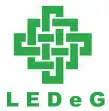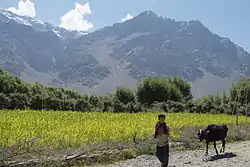Ladakh Ecological Development and Environmental Group
The Ladakh Ecological Development and Environmental Group (LEDeG) is an environmental NGO based in Karzoo, Leh, Ladakh Union Territory in northern India. In 1986, it received the Right Livelihood Award "for preserving the traditional culture and values of Ladakh against the onslaught of tourism and development."[1]
 | |
| Focus | Renewable energy |
|---|---|
Area served | Ladakh |
Key people | Helena Norberg-Hodge (founder) Sarla Chhewang (president) Eshey Tondup (executive director) |
| Award(s) | Right Livelihood Award |
| Website | http://www.ledeg.org/ |
Goals
Established independently in 1983, its goal is to promote ecological and sustainable development of Ladakh, focusing mainly on the promotion of renewable energy, particularly solar energy.[2]
The organization pays particular attention to environmental, economic and cultural issues affecting disadvantaged communities in Ladakh.[3]
The official website has stated exactly what the organization is geared towards:
- To encourage awareness in the Ladakhi people of the need to consider the long-term effects of development,[4]
- To encourage awareness in the Ladakhi people of the potential value of traditional culture in Ladakh’s development,[4]
- To encourage the use of perpetually renewable natural resources in Ladakh,[4]
- To test and demonstrate low-cost technologies which make use of such perpetually renewable natural resources,[4]
- To provide financial assistance for appropriate, community based development projects,[4]
- To raise funds for the achievement of the objective through donations, grants, collection etc., and through the carrying on of any business, this may help to promote the above objectives,[4]
- To pursue the above objectives with the goal of encouraging, an ecologically sound and sustainable future for the Ladakhi’s people and their land.[4]
Project history
The International Society for Ecology and Culture (ISEC), now known as Local Futures, originally established LEDeG in Ladakh in 1978. By 1980, it had become a small group under the leadership of ISEC's founder and notable environmental activist in the Ladakh region, Helena Norberg-Hodge.[5][6] Although LEDeG became independent in 1983, it is still closely connected to Local Futures/ISEC in achieving its goals of ecological development and sustainability in Ladakh.[5] LEDeG has made some considerable progress in Ladakh towards renewable energy and improving efficiency to benefit the local people.[3] In 2003-2007, they installed a solar photovoltaic power plant at Tangtse, with support from ICEF, MNRE and LAHDC.[3] The power plant supplies electricity to over 350 households, for five hours in a day.[3] In the years since its founding, LEDeG has become the most influential non-governmental organization in the Ladakh region.[5]

LEDeG is currently working on the European Union-funded Liveable Leh project that focuses on achieving Sustainable Development Goal-6 (Clean water and sanitation) and SDG-11 (Sustainable cities and communities) for urban Leh to make its town a resilient, inclusive and liveable Himalayan town.
References
- "Helena Norberg-Hodge / Ladakh Ecological Development Group". The Right Livelihood Award. Retrieved 8 January 2020.
- Mann, Rann Singh (2002). Ladakh then and now: cultural, ecological, and political. Mittal Publications. p. 288. ISBN 81-7099-838-7.
- "About us". Ladakh Ecological Development and Environmental Group. Archived from the original on 8 July 2012. Retrieved 14 November 2009.
- "Our Mission". Ladakh Ecological Development and Environmental Group. Archived from the original on 8 July 2012. Retrieved 14 November 2009.
- "The Ladakh Project". International Society for Ecology and Culture. Retrieved 3 May 2015.
- Yoga Journal (Issue 104). Active Interest Media, Inc. May–June 1992. p. 108. ISSN 0191-0965.